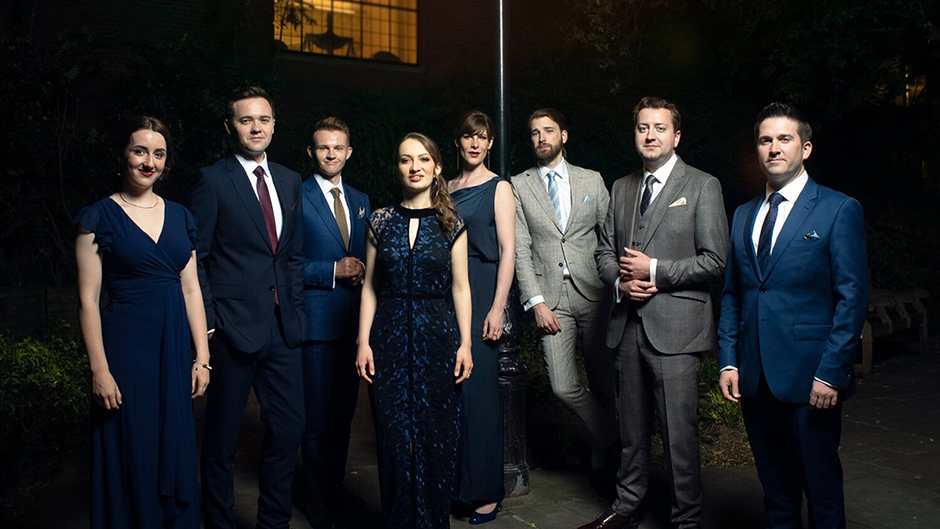Last year, as she planned a European tour for the Frost Chorale, Amanda Quist went the extra mile to bring her students to England to sing with British vocal ensemble sensation, the 'Rolls Royce of British a cappella ensembles,' the one and only, VOCES8. Quist is an American conductor and Director of Choral Activities of the University of Miami and knew that a collaboration with the professional choir would bring a rich set of artistic experiences to her students.
Before the trip, Quist talked with Paul Smith, co-founder of the group, with his brother Barnaby. "My goal is for our students to have the opportunity to sing with VOCES8," she told him. "When I spoke with Paul, he looked at his calendar, and it just so happened that the only free day in their entire calendar was during the week that we were going to be in London!"
So, in a strange but perfect way, Frost Chorale sang with the group at the VOCES8 Centre in London for the first time. And now, a year later, they reciprocated the favor and brought VOCES8 to their area code—the 305. Once in Miami, the renowned a cappella ensemble got a chance to do what most travelers do. Enjoy an exclusive strip of beach and let loose in a relaxed, fun, tropical setting. But their biggest highlight was exploring a Miami icon— the Frost School of Music at the University of Miami.
"Frost has a fantastic team at the university. We don't work in an academic setting, so coming to this campus is a dream," said Paul, as he gestured with admiration at his surroundings—a dressing room inside UM's Maurice Gusman Hall, an outstanding 600-seat performance venue used for a variety of events including recitals, concerts, recordings, and other related projects
"Our job is performing concerts, visiting schools, and doing what we love in the recording studio. We like to inspire young artists to embrace what they have and celebrate the joy of singing. To grow to achieve what we do daily —to go everywhere and share beautiful music with their voices."
And beautiful music is what hundreds of people heard last Friday night at Corpus Christi Catholic Church in Miami. The program presented music that spans more than 500 years. Choral music is unique and possibly the oldest form of ensemble music. After all, people have used their voices forever. VOCES8 and Frost Chorale sang repertoire from Europe and other parts of the world—from the Renaissance and Baroque periods to Latin American folksongs and jazz; it was a memorable evening that captivated each audience member.
"These singers showed that the human voice can sing different styles—and it's all beautiful—that's what we teach at Frost," added Quist. She also pointed out the wide variety of genres taught at the school, and the importance of varied vocal colors, comparing them using the musical elements of pitch, volume, articulation, and timbre.
Before the night's performance, we met and chatted with VOCES8. Barnaby Smith, Eleonore Cockerham, Molly Noon, Katie Jeffries-Harris, Euan Williamson, Christopher Moore, Blake Morgan, (the only American in the group), and Jonathan Dacey sat in a circle and, one by one told their story of how they became part of VOCES8.
We observed that their voices and personalities align and complement one another, as well as their passion for music education. They have worked with more than 40,000 people worldwide each year in partnership with schools and communities thanks to the VOCES8 Foundation.
"If these students learned anything from us this week, we hope we can sum it up in just one word: flexibility," expressed Dacey. "In terms of your voice, what you can do with your voice, expanding your horizons and what that is," he said, addressing the students. "But, also in terms of a career. You can choose music education and have a performing career. Or you can choose a recording career and do something else. It's about opening your mind. We're inspiring the next generation of choral musicians to be flexible. That's been Paul and Barnaby's goal right from the start."
And as for what Quist hopes her students took from this experience, "I hope they will fall even more in love with singing together and that they see and understand that choral singing can exist at a very, very high professional level and that it is a choice for performance. I hope they are inspired and see the possibility of being in a group like this if that's what they want to do. I hope they remember the little tips and tricks about singing in choirs and as soloists, their voice and artistry, and how to communicate and emote to an audience. And really, how to be an artist."

